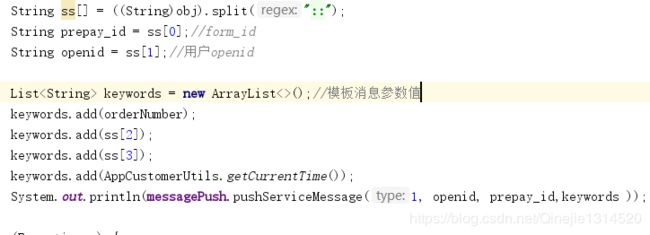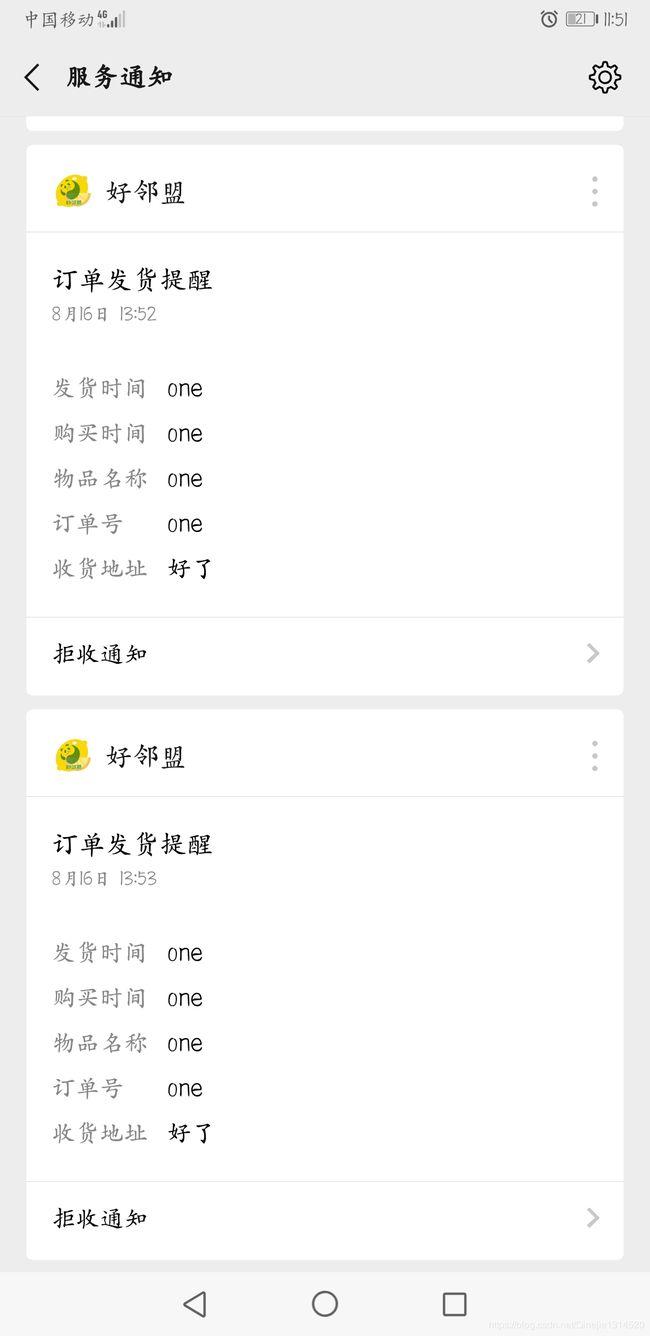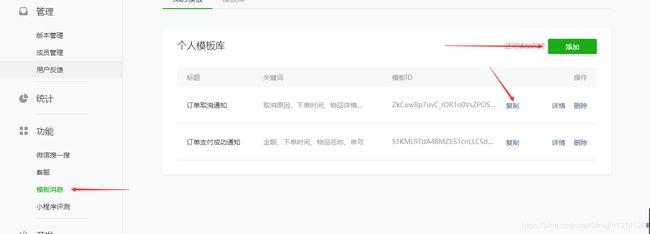微信小程序 服务通知
前言
实现效果
实现必要
代码实现
下面代码没有问题,这是我项目当中截取的部分。下面代码是我项目中直接复制过来的。仅供参考。具体实现代码在最底下
import com.alibaba.fastjson.JSON;
import com.example.community.app.user.common.HttpClient;
import com.example.community.app.user.common.TemplateData;
import com.example.community.common.redis.RedisService;
import org.springframework.beans.factory.annotation.Autowired;
import org.springframework.beans.factory.annotation.Value;
import org.springframework.stereotype.Component;
import java.util.HashMap;
import java.util.List;
import java.util.Map;
@Component
public class MessagePush {
@Autowired RedisService redisService;
@Value("${customer.app.secret}")
private String AppSecret;
@Value("${customer.app.id}")
private String AppId;
@Value("${official.app.secret}")
private String OfficialAppSecret;
@Value("${official.app.id}")
private String OfficialAppId;
@Value("${service.template.message.order.payment.successful}")
private String ServicePushOrderPayMentSuccess;
@Value("${service.template.message.order.cancellation}")
private String ServicePushOrderCancellation;
@Value("${service.template.message.order.deliver}")
private String ServicePushOrderDeliver;
@Value("${official.template.message.order.payment.successful}")
private String OfficialPushOrderPayMentSuccess;
@Value("${wx.getAccessToken}")
private String AccessTokenUrl;
@Value("${wx.service.template.message.send}")
private String ServiceTemplateMessageSendUrl;
public Object getServiceAccessToken(){
Object acc = redisService.get("service_push_access_token");
if(acc == null){
String res = HttpClient.doGet(AccessTokenUrl+"?grant_type=client_credential&appid="+AppId+"&secret="+AppSecret);
Map mapType = JSON.parseObject(res,Map.class);
redisService.set("service_push_access_token", mapType.get("access_token"), 7150L);
return mapType.get("access_token");
}
return acc;
}
//小程序服务通知
public String pushServiceMessage(Integer type, String touser, String form_id, List keywords){
Mapmap = new HashMap<>();
map.put("touser", touser);
switch (type){
case 1:map.put("template_id", ServicePushOrderPayMentSuccess); break;//支付成功
case 2:map.put("template_id", ServicePushOrderCancellation); break;//取消订单
case 3:map.put("template_id", ServicePushOrderDeliver);break;//发货通知
default:
map.put("template_id", ServicePushOrderPayMentSuccess); break;
}
map.put("form_id", form_id);
Mapmap1 = new HashMap<>();
for(int i = 0; i < keywords.size(); i++){
map1.put("keyword"+(i+1), new TemplateData(keywords.get(i), null));
}
map.put("data", map1);
return HttpClient.doPost(ServiceTemplateMessageSendUrl+"?access_token="+getServiceAccessToken(), map);
}
}
具体实现代码,裁剪后的代码。下面的代码可以直接复制然后运行即可,缺少的包导入进去
import com.alibaba.fastjson.JSON;
import org.springframework.beans.factory.annotation.Autowired;
import org.springframework.beans.factory.annotation.Value;
import org.springframework.stereotype.Component;
import java.util.HashMap;
import java.util.List;
import java.util.Map;
public class MessagePush {
private String AppSecret = “小程序密匙,在小程序管理页面可以找到”;
private String AppId = “小程序appip,在小程序管理页面可以找到”;
private String ServicePushOrderPayMentSuccess = "t1ictRv_Hv7-ww6TM_7BheLu02UUl_SurJxPHc09YEg";//订单支付成功的模板的id
private String AccessTokenUrl = “https://api.weixin.qq.com/cgi-bin/token”;//获取小程序后台鉴权接口,可以不变
private String ServiceTemplateMessageSendUrl = “https://api.weixin.qq.com/cgi-bin/message/wxopen/template/send”;//发送模板消息调用的接口
public Object getServiceAccessToken(){
String res = HttpClient.doGet(AccessTokenUrl+"?grant_type=client_credential&appid="+AppId+"&secret="+AppSecret);
Map mapType = JSON.parseObject(res,Map.class);
return mapType.get("access_token");
return acc;
}
//小程序服务通知
//表单提交场景下,为 submit 事件带上的 formId;支付场景下,为本次支付的 prepay_id,这些对应就是form_id
//touser微信对象的openid
//keywords对应模板消息的各个参数的值
public String pushServiceMessage(Integer type, String touser, String form_id, List keywords){
Mapmap = new HashMap<>();
map.put("touser", touser);
switch (type){
case 1:map.put("template_id", ServicePushOrderPayMentSuccess); break;//支付成功
default:
map.put("template_id", ServicePushOrderPayMentSuccess); break;
}
map.put("form_id", form_id);
Mapmap1 = new HashMap<>();
for(int i = 0; i < keywords.size(); i++){
map1.put("keyword"+(i+1), new TemplateData(keywords.get(i), null));
}
map.put("data", map1);
return HttpClient.doPost(ServiceTemplateMessageSendUrl+"?access_token="+getServiceAccessToken(), map);
}
}
发送http请求的工具类
package com.example.community.app.user.common;
import com.alibaba.fastjson.JSONObject;
import org.apache.http.HttpEntity;
import org.apache.http.client.ClientProtocolException;
import org.apache.http.client.config.RequestConfig;
import org.apache.http.client.methods.CloseableHttpResponse;
import org.apache.http.client.methods.HttpGet;
import org.apache.http.client.methods.HttpPost;
import org.apache.http.entity.StringEntity;
import org.apache.http.impl.client.CloseableHttpClient;
import org.apache.http.impl.client.HttpClients;
import org.apache.http.util.EntityUtils;
import java.io.IOException;
import java.util.Map;
public class HttpClient {
public static String doGet(String url) {
CloseableHttpClient httpClient = null;
CloseableHttpResponse response = null;
String result = "";
try {
// 通过址默认配置创建一个httpClient实例
httpClient = HttpClients.createDefault();
// 创建httpGet远程连接实例
HttpGet httpGet = new HttpGet(url);
// // 设置请求头信息,鉴权
// httpGet.setHeader("Authorization", "Bearer da3efcbf-0845-4fe3-8aba-ee040be542c0");
// 设置配置请求参数
RequestConfig requestConfig = RequestConfig.custom().setConnectTimeout(35000)// 连接主机服务超时时间
.setConnectionRequestTimeout(35000)// 请求超时时间
.setSocketTimeout(60000)// 数据读取超时时间
.build();
// 为httpGet实例设置配置
httpGet.setConfig(requestConfig);
// 执行get请求得到返回对象
response = httpClient.execute(httpGet);
// 通过返回对象获取返回数据
HttpEntity entity = response.getEntity();
// 通过EntityUtils中的toString方法将结果转换为字符串
result = EntityUtils.toString(entity);
} catch (ClientProtocolException e) {
e.printStackTrace();
} catch (IOException e) {
e.printStackTrace();
} finally {
// 关闭资源
if (null != response) {
try {
response.close();
} catch (IOException e) {
e.printStackTrace();
}
}
if (null != httpClient) {
try {
httpClient.close();
} catch (IOException e) {
e.printStackTrace();
}
}
}
return result;
}
public static String doPost(String url, Map paramMap) {
CloseableHttpClient httpClient = null;
CloseableHttpResponse httpResponse = null;
String result = "";
// 创建httpClient实例
httpClient = HttpClients.createDefault();
// 创建httpPost远程连接实例
HttpPost httpPost = new HttpPost(url);
// 配置请求参数实例
RequestConfig requestConfig = RequestConfig.custom().setConnectTimeout(35000)// 设置连接主机服务超时时间
.setConnectionRequestTimeout(35000)// 设置连接请求超时时间
.setSocketTimeout(60000)// 设置读取数据连接超时时间
.build();
// 为httpPost实例设置配置
httpPost.setConfig(requestConfig);
// 设置请求头
httpPost.addHeader("Content-Type", "application/json");
// 封装post请求参数
// if (null != paramMap && paramMap.size() > 0) {
// List nvps = new ArrayList();
// // 通过map集成entrySet方法获取entity
// Set> entrySet = paramMap.entrySet();
// // 循环遍历,获取迭代器
// Iterator> iterator = entrySet.iterator();
// while (iterator.hasNext()) {
// Map.Entry mapEntry = iterator.next();
// nvps.add(new BasicNameValuePair(mapEntry.getKey(), mapEntry.getValue().toString()));
// }
// System.out.println(JSONObject.toJSONString(nvps));
// // 为httpPost设置封装好的请求参数
// try {
// httpPost.setEntity(new UrlEncodedFormEntity(nvps, "UTF-8"));
// } catch (UnsupportedEncodingException e) {
// e.printStackTrace();
// }
// }
httpPost.setEntity(new StringEntity(JSONObject.toJSONString(paramMap),"utf-8"));
try {
// httpClient对象执行post请求,并返回响应参数对象
httpResponse = httpClient.execute(httpPost);
// 从响应对象中获取响应内容
HttpEntity entity = httpResponse.getEntity();
result = EntityUtils.toString(entity);
} catch (ClientProtocolException e) {
e.printStackTrace();
} catch (IOException e) {
e.printStackTrace();
} finally {
// 关闭资源
if (null != httpResponse) {
try {
httpResponse.close();
} catch (IOException e) {
e.printStackTrace();
}
}
if (null != httpClient) {
try {
httpClient.close();
} catch (IOException e) {
e.printStackTrace();
}
}
}
return result;
}
}
最后,在一个main方法中,调用这个pushServiceMessage方法,即可发送成功。如果发送失败有什么微信方面的错误,方法返回的字符串输出即可展示错误信息。

总结
好像写的比较粗糙,想要写的非常清除明了,还需要努力努力啊!希望这篇文章可以对大家有用。

